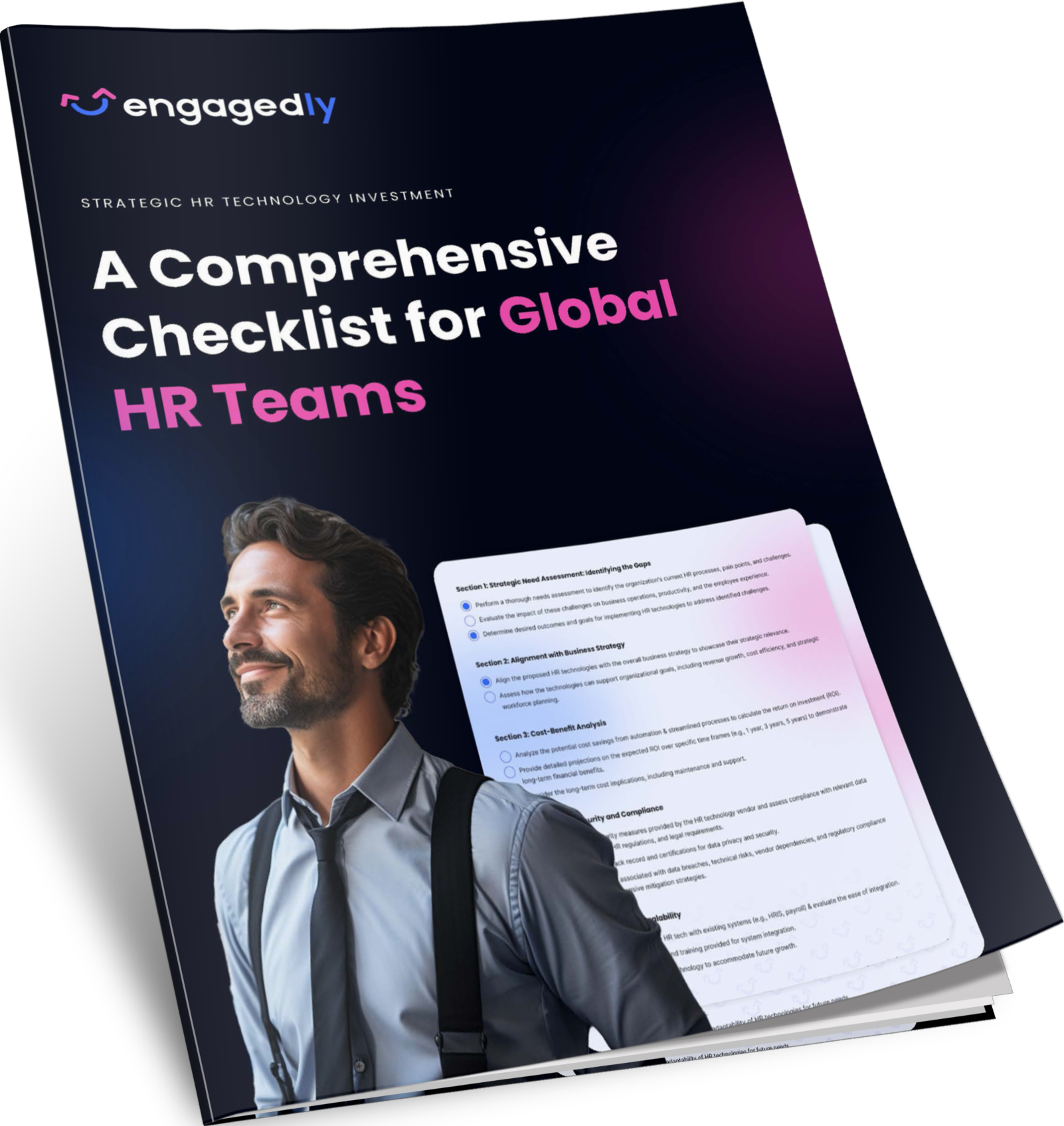Did you know that managers spend an average of 210 hours a year on performance discussions with their employees? Though performance review discussion is an integral part of every organization, almost everyone dreads them.
Do they have to be that scary? Well, not if you discuss just the right things with your employees during the review!
As managers, it is your responsibility to conduct performance discussions with your employees and provide them with a fair and accurate review.
It’s important to be prepared ahead of time, but it is equally important to bring up the right things during the performance discussions.
These discussions can result in strategic planning of workplace goals and objectives and help you set OKRs for your team easily. Moreover, asking the right things will help you locate bottlenecks in the process and may even lead to subtle things that can increase the team’s productivity.
This article will provide you with 7 things to bring up during performance reviews to get the most out of the discussions.
Also Read: Onboarding Survey and How to Conduct it
What’s the Purpose of Performance Review Discussions?
The purpose of a performance review discussion is to understand the performance of an employee in the core business areas. The responsibilities and actions performed by an employee in accomplishing the tasks and any other initiatives taken by them to drive the team and the organization towards their objectives.
It is important to understand the things to discuss during the performance review to make it streamlined and employee-centered. The below points will help you in making your next review meeting more strategized and focused on the employee’s improvement.
Also Read: Performance Review Discussion Tips for 2022
7 Things to Bring Up During Performance Reviews
It is important to understand the subtleties of performance reviews to make it streamlined and employee-centered. Here is the list of 7 things you must cover in every performance discussion to let your employees have a fair and accurate understanding of their performance.
1. Acknowledge Accomplishments
Always remember to acknowledge the good work that your employees do or find something good about your direct reports to talk about in a performance review meeting. They need to understand that you are monitoring both the positive and negative aspects of their performance. Moreover, this helps you make them feel comfortable with the conversation.
2. Talk About The Gaps In Knowledge
A leader always lets people know about their shortcomings and shows them a way to improve themselves. It is very important for you as a manager to recognize and talk about your employees’ gaps in knowledge. This helps them understand what is expected of them and evaluate themselves better.
Also read: Performance review questions for managers: A guide to performance reviews
3. Discuss Things That Need Improvement/ Change
There are many things other than just the knowledge gap that result in a lack of performance. As a manager, you should let your team members know what could be changed about their current performance and where they need improvement. A performance review meeting should be a place where you both communicate and plan where you could improve as individuals and as a team to improve your performance.
4. Ask For Suggestions
Sometimes, it is important to listen to your employees. They could have really valuable suggestions to give about how the team could function and contribute to organizational success. Also, asking for suggestions from your employees gives them a chance to participate and contribute to the organization actively.
Also Read: 7 Reason To Set Employee Goals
5. Discuss Employee’s Long-term and Short-term Goals
As a manager, you should know the answer to these two questions about your employee.
According to HRM Canada, 85% of workers feel they could be more efficient at work, but because of skill underutilization, do not live up to their full potential!
Asking about their short-term goals makes you understand what they have planned for the current role in your organization helps you both stay on the same page concerning their goals and helps you utilize their skills and potential to the fullest. Asking them about their long-term goals will help you understand what they expect from their current job and how they would be able to adjust to the changing trends in your industry.
6. Clarity Of Role
Research from the University of Cambridge tells us that employees find more success in their roles when they’re given clear expectations. Utilize your performance review meeting to clarify the role of your employees in the organization and set specific goals for them.
Also read: Your Comprehensive Guide To 360-Degree Feedback In The Modern Workplace
7. Make A Performance Improvement Plan
Once you clarify your employee’s role in the organization, it is important to make a performance improvement plan for them. This doesn’t imply that their past performance wasn’t good enough, you can always aim to improve your future performance. So use this performance review meeting to come up with a proper performance plan and set OKRs for your employees!
How Engagedly’s Performance Review Module Fosters Meaningful Dialogue and Growth
Performance reviews often fall short of their potential, bogged down by formality and one-sided feedback. This can lead to missed opportunities for development and hinder organizational progress. Engagedly’s performance review module aims to bridge this gap, facilitating effective dialogue, data-driven insights, and actionable outcomes to empower both individuals and organizations.
Structured Dialogue for Focused Conversations:
- Pre-defined and Customizable Questions: Engagedly provides role-specific question sets to guide discussions, ensuring key areas are addressed. Managers can further personalize these questions to tailor the review to individual needs and objectives.
- Real-time Feedback Exchange: The platform encourages a two-way dialogue, allowing employees to contribute their perspectives alongside manager feedback. This fosters open communication and builds trust.
Data-Driven Insights for Informed Decisions:
- Performance Data Integration: Engagedly seamlessly integrates data from various sources, including goals, feedback, and recognition metrics. This paints a comprehensive picture of individual performance and contribution.
- Visualized Data: Data is presented in clear and concise dashboards, making it easy for both managers and employees to understand strengths, weaknesses, and areas for improvement.
- Goal Alignment Review: The review process facilitates assessing progress towards individual and team goals, ensuring alignment and identifying potential roadblocks or adjustments needed.
Actionable Outcomes for Continuous Improvement:
- Personalized Development Plans: Based on the review discussion and data insights, Engagedly helps create personalized development plans. These plans outline concrete steps for improvement, skill development, and career advancement.
- Continuous Feedback and Growth: The platform encourages ongoing performance conversations throughout the year, fostering a culture of growth and continuous improvement.
- SMART Goal Setting for Future Success: The review informs the setting of SMART goals for the next period, ensuring alignment with individual and organizational objectives and driving future success.
Engagedly’s performance review module extends beyond the annual formality, offering:
- Transparency and Trust: The platform encourages open communication and trust-building between managers and employees, leading to a more engaged and productive workforce.
- Informed Talent Management: Data-driven insights enable informed talent management decisions, promoting talent development, succession planning, and retention.
- Organizational Growth: By aligning individual development with organizational goals, Engagedly empowers the entire organization to reach its full potential.
Engagedly’s performance review module is not just a checklist; it’s a catalyst for meaningful dialogue, actionable insights, and continuous improvement. Transforming performance reviews into productive conversations that drive growth, unlocks the potential of both individuals and organizations, paving the way for a thriving future.
Conclusion
A performance discussion is an integral part of an organization. It helps in finding potential employees and providing them with the right opportunities and skills to excel in their careers. Additionally, managers can also provide constructive feedback to employees whose performance is not on par with the standards. By inculcating the review meeting points discussed in this article, you can make the process clear, actionable, and employee-centered. You can use these performance review topics during your annual, quarterly, or biannual performance review discussion.
Subscribe To The Engagedly Newsletter






